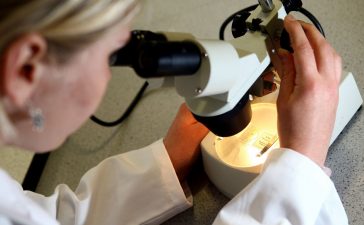Brain scans have revealed six distinct types of depression, a discovery that could lead to better, more tailored treatment.
Using artificial intelligence (AI), scientists from the US and Australia were able to separate the different types and then assess how they responded to various treatments.
Around one in six UK adults will experience a common mental disorder, including depression or anxiety.
However, finding the right treatment can be a long and often stressful journey, while around 30% of people with the condition have what is known as treatment-resistant depression – meaning despite multiple types of medication or therapy, their symptoms have not improved.
Now, the team is hoping that by being able to categorise the type of depression, they will also be able to pair it with the most appropriate treatment, removing the element of trial and error.
The scientists, from Stanford University in California and the University of Sydney among others, collected data from 801 with depression and anxiety. Using functional magnetic resonance imaging (fMRI), they scanned participants’ brains first while they were at rest, then while completing a variety of tasks to test their cognitive and emotional functioning.
Using AI to analyse the results, the team were able to group the participants into six groups, or ‘biotypes’.
Once the different types of depression had been identified, the team then randomly assigned 250 of the participants into treatment groups, in which they received three commonly used antidepressants or behavioural talk therapy.
The study, published in the journal Nature Medicine, found that one subtype, characterised by overactivity in cognitive regions of the brain, showed the best response to the antidepressant venlafaxine (commonly known as Effexor) compared to other biotypes.
Those whose brains at rest have higher levels of activity among the regions associated with depression and problem solving responded better to behavioural talk therapy.
A third subtype, those who have lower levels of activity in the area of the brain that controls attention, were the least likely to see improvement from talk therapy.
Professor Leanne Williams, from Stanford, said: ‘The goal of our work is figuring out how we can get it right the first time. It’s very frustrating to be in the field of depression and not have a better alternative to this one-size-fits-all approach.
‘To our knowledge, this is the first time we’ve been able to demonstrate that depression can be explained by different disruptions to the functioning of the brain.
‘In essence, it’s a demonstration of a personalised medicine approach for mental health based on objective measures of brain function.’
What is depression?
Depression is more than simply feeling unhappy or fed up for a few days.
Most people go through periods of feeling down, but when you’re depressed you feel persistently sad for weeks or months, rather than just a few days.
Some people think depression is trivial and not a genuine health condition. They’re wrong – it is a real illness with real symptoms. Depression is not a sign of weakness or something you can ‘snap out of’ by ‘pulling yourself together’.
The good news is that with the right treatment and support, most people with depression can make a full recovery.
Professor Williams and her team are now expanding the study to include more people, and hope to test treatments for all six biotypes – including those not traditionally used for depression.
Co-author Dr Jun Ma said: ‘To really move the field toward precision psychiatry, we need to identify treatments most likely to be effective for patients and get them on that treatment as soon as possible.’
Often patients have to try a variety of medications and therapy, not only leaving them suffering from the condition for longer, but also potentially making it worse when nothing seems to help.
She added: ‘Having information on their brain function, in particular the validated signatures we evaluated in this study, would help inform more precise treatment and prescriptions for individuals.’
MORE : Lidl’s fresh chicken ‘contained superbugs’, campaigners claim
MORE : Three most common E. coli symptoms shared as UK supermarkets recall sandwiches
MORE : High-fat diets have an ‘extraordinary’ effect on anxiety
Get your need-to-know
latest news, feel-good stories, analysis and more
This site is protected by reCAPTCHA and the Google Privacy Policy and Terms of Service apply.














